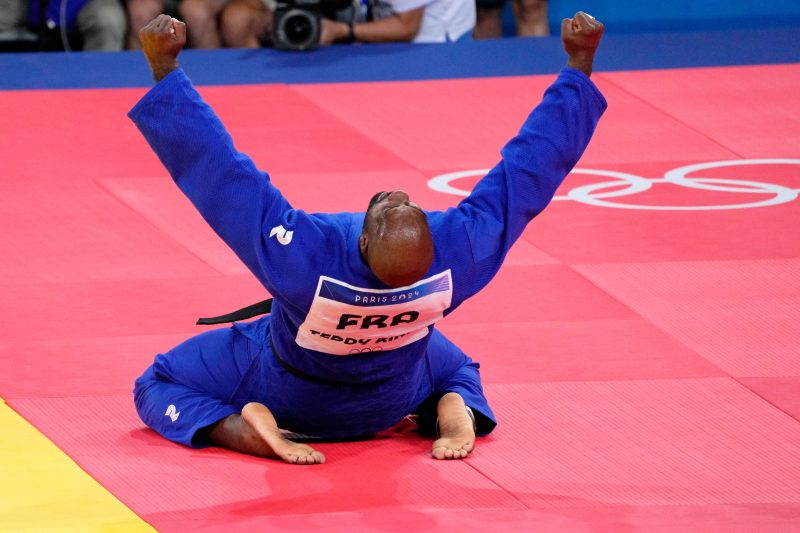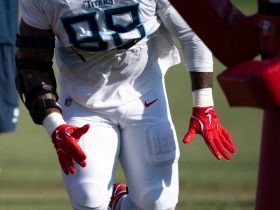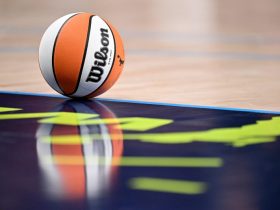PARIS — They started chanting his name several minutes before he even entered the arena Friday night. They waved French flags and took out their phones, some clapping their hands, some clutching cardboard cutouts of his face or signs that read ‘Teddy Winner’ and ‘Ici C’est Paris, Ici C’est Riner’ − ‘This Is Paris, This Is Riner.’
You might not have heard of the man who caused all this commotion. That’s OK. His name is Teddy Riner, and he’s a French judoka − a larger-than-life athlete in this niche sport, which barely registers in the United States but has become immensely popular here in France. And on Friday, he achieved the sort of immortal sports moment that few athletes can realistically dream of, let alone achieve.
In the Olympic final, of perhaps his final Games, less than two miles from the neighborhood in Paris where he grew up, Riner won his third individual Olympic gold medal in judo and became the most decorated athlete in the history of his sport. His victory in the final − a sudden, sweeping takedown of South Korea’s Kim Min-jong − came exactly one week after he received the prestigious assignment of helping light the Olympic cauldron at the opening ceremony.
Riner, 35, is the first athlete since Australian Cathy Freeman in 2000 to both light the cauldron and go on to win gold. He called it ‘my perfect day.’
‘It’s a dream,’ he said. ‘A real dream.’
2024 Olympic medals: Who is leading the medal count? Follow along as we track the medals for every sport.
When his win became official, Riner bowed to his opponent then fell to his knees and flexed his chest like Superman, letting out a triumphant scream. He climbed down off the mat and flashed three fingers, and a wide smile. Retired French basketball player Tony Parker met him with a hug. President Emmanuel Macron followed.
Six Olympic medals, the most ever by a judoka
Riner’s victory is likely to be an iconic scene from these Games, remniscient of one that had unfolded 24 hours earlier at an arena across town, where American gymnast Simone Biles won her second individual all-around gold.
While their sports and bodies could not be much more different − Biles is 4 feet 8, while Riner is listed at 6 feet 8 and 309 pounds − both are all-time icons at perhaps their all-time peaks, concentrated greatness on display.
The sweetner with Riner’s moment was that it happened at home − within walking distance, even, of the Aquaboulevard neighborhood that his family moved to when he was a child. In the U.S., he might be a relative unknown. But in France, and in Paris in particular, he is often hailed as ‘Le Plus Grand’ − The Greatest.
Since making his international debut in 2006, Riner has been vacilated between being close to unbeatable and actually unbeatable. Between 2010 and 2020, he won a whopping 154 matches without a loss. He’s earned five European titles, 11 world championships and, with Friday’s victory, he’s now up to six Olympic medals − the most ever by a judoka. He won golds in London and Rio, sandwiched by individual bronzes in Beijing and Tokyo. (His other medal was in a team event.)
Riner, who has 1.4 million followers on Instagram, has become such an indomitable figure in his sport that two of three people he shared the podium with Friday described him as their idol.
‘When I was starting to train judo, I was watching and following Teddy Riner,’ said bronze medalist Temur Rakhimov of Tajikistan, whom Riner beat in the semifinals. ‘This is a dream for everybody, to compete with Teddy Riner.’
Riner’s influence on judo’s popularity in France
Riner, along with two-time Olympic gold medalist David Douillet, is one of the primary reasons that the sport itself has become so popular in France. According to the French Judo Federation, there are about 530,000 judokas in the country, spread across more than 5,000 clubs. Japan, where judo originated, is now the only country that has won more Olympic medals in the sport than France.
Combine that popularity with Riner’s greatness and you get the frenetic, glorious atmosphere at Champ-de-Mars Arena on Friday night, where space was so limited that reporters wishing to cover the medal bouts needed to request special tickets − something that usually only happens in marquee sports like swimming or gymnastics. If the arena holds 6,900 fans, as stated, then probably 5,000 of them were there for Riner. Even security guards and volunteers took brief breaks from their duties, snapping pictures on their phones to document the day.
Despite that pressure, of competing at home after lighting the Olympic cauldron, and some nervy moments in earlier rounds, Riner repeatedly described Friday as ‘a perfect day.’ He said he wished that all athletes could experience a moment like the one he’d just had, celebrating a historic gold medal in front of an adoring hometown crowd.
‘When we have perfect Olympics like what I did today, you’re happy and you want to actually enjoy the ride,’ Riner said. ‘You want it to last, for sure.’
Contact Tom Schad at tschad@usatoday.com or on social media @Tom_Schad.






